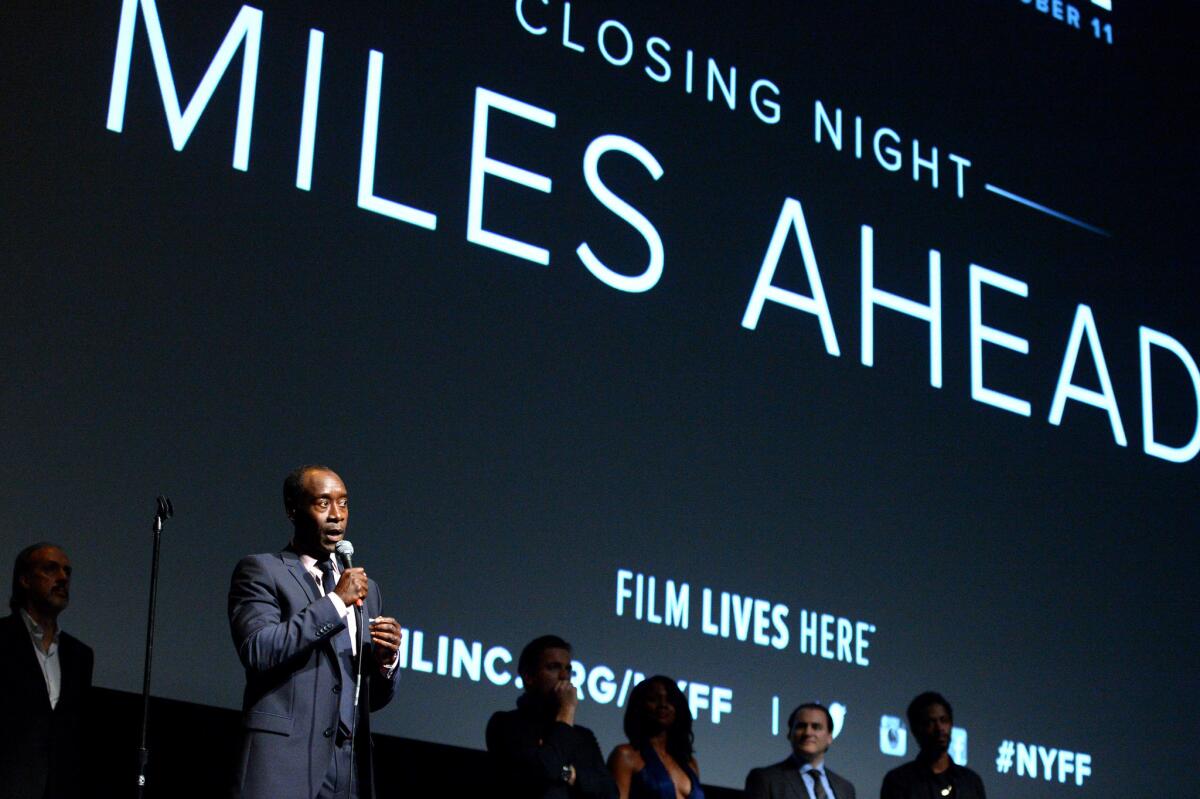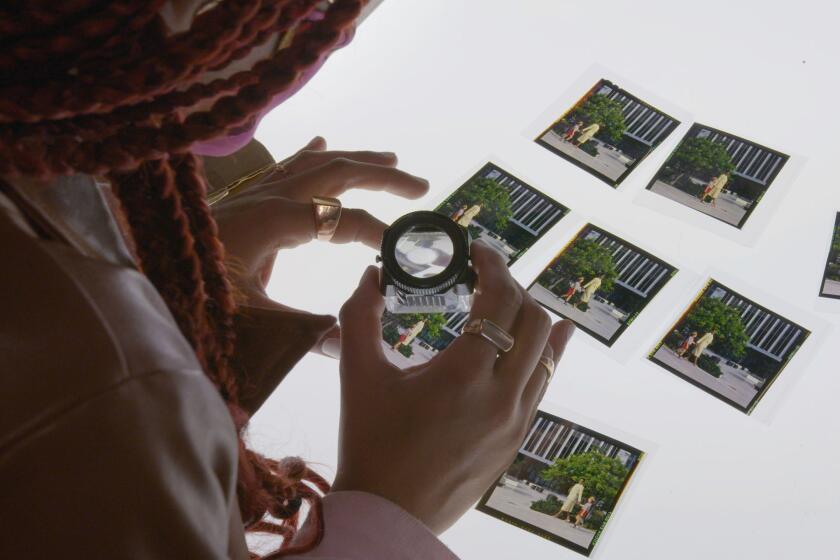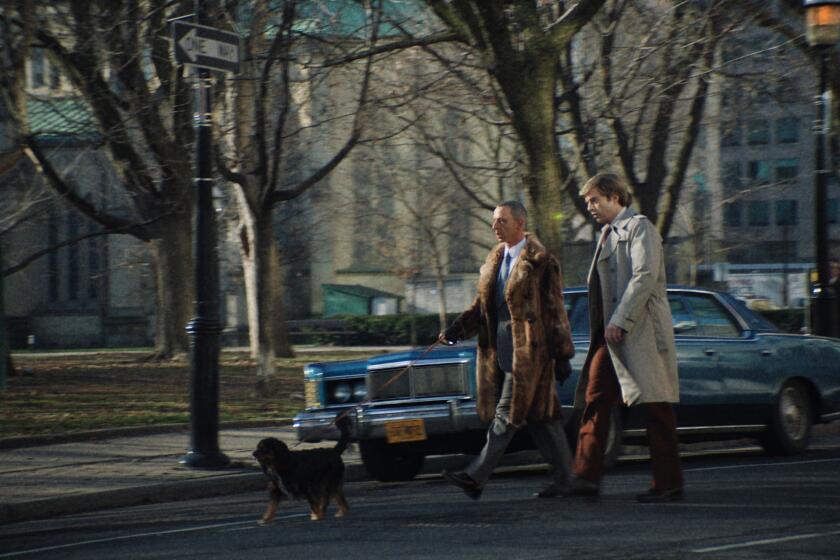Will Don Cheadle shake the establishment with ‘Miles Ahead’?

Filmmaker Don Cheadle, left, speaks on stage at the closing night gala screening of “Miles Ahead.”
The life of Miles Davis has been studied and probed many times over. Probably not the way Don Cheadle has done it, though.
Cheadle is the director, star, producer, co-writer and all-around wrangler for the new movie “Miles Ahead,” which closed the New York Film Festival this past weekend. The movie is as subversive -- both to the canon of its musical legend subject and the genre of the biopic -- as it is fun to experience.
If you haven’t caught up yet with any writing on the film — or if you have, and still can’t quite make heads or tails of it — here’s how it breaks down. (And here’s why Cheadle really doesn’t care if you have an issue with how he did it.)
SIGN UP for the free Indie Focus movies newsletter >>
The movie opens in the most traditional of biopic-y ways: Davis (Cheadle) is giving an interview to a journalist at an indeterminate 1970s time, relatively late in his career. The reporter asks when he lost his mojo and how he got it back. Davis, gravely of voice and short of temper, says he doesn’t really understand the question. Then we cut to the most un-biopic-y of flashbacks: to a car chase in which Davis appears to be firing a gun back at his pursuer.
A moment later we are in yet another flashback -- of Davis puttering reclusively around his house, clearly in a creative rut, when a Rolling Stone reporter named Dave Brill (Ewan McGregor) turns up to try to wrangle an interview from him. The pair end up on a rather wild adventure, which includes facing off some shysters in the offices of his record company Columbia and elsewhere, which would be crazy enough if the movie then didn’t flash back from there to an earlier, more blissful time Davis had with love interest Frances Taylor (Emayatzy Corinealdi), who would become his wife.
The film then basically alternates between the Brill-Davis perambulations and Davis’ earlier times with his spouse (soon not so idealistic), before eventually circling back to the first flashback, the car chase, Tarantino-style.
A stylized structure is just one unexpected gambit in the film, however. For a movie about Miles Davis, there are actually very few scenes of him making music -- Davis is in a creative rut, after all. There are, instead moments of unlikely friendship and violent romping, especially when Davis and Brill really have to up the ante with some vultures who have taken what Davis says is his. (There is also a scene of domestic violence that Cheadle shoots wordlessly and to music, like a ballet, and it’s both artful and disturbing.)
It’s all meant to show Davis’ obsessiveness, and how it was both tragic flaw and creative inspiration. In so doing, it gets at many of the themes one wants from a biopic -- it just does it in the most unconventional of ways. This may be the first biography to come wrapped in a blaxploitation buddy comedy.
“I thought highlighting him trying to come back, and writer’s block, and finding his voice was relatable to everybody more than trying to figure out how to specifically demonstrate Miles’ genius,” Cheadle said.
The filmmaker, who spent a decade developing the project (he raised a chunk of the $8-million budget on crowdfunding sites), notes that while much of the action is fictionalized, a lot of it could have happened. Davis was known for having guns everywhere, and he had a famously fractious relationship with Columbia.
But of course there’s a deeper point here too, one embedded in the movie’s structure. In making a film that breaks the mold, Cheadle is matching the form to its content. This isn’t just a director riffing because he’s bored, or has a good idea -- he’s riffing because he thinks his riffy subject deserves that treatment.
As for those historians or sticklers who might be unwilling to accept a movie that leaves out chunks of Davis’ life, Cheadle said, “I didn’t want to attempt to be playing cute with the story and say, ‘This is a true story.’ I wanted it to be creative. I wanted it to be interesting. I wanted it to be different.” (In this sense Cheadle is part of a larger class of biopics that take a more impressionistic view of the genre.)
At the afterparty, Cheadle talked about how he didn’t want to do a movie “about Miles Davis” -- he wanted to “do Miles Davis.” Any time he felt a little lost or wondered if he was wandering too far from the literal text of Davis’ life, he would read none other than the writings of the musician himself, who was always talking about mixing it up, not repeating himself, trying to play what hadn’t been played before. Miles Davis was his guide, essentially, to not making a traditional movie about Miles Davis.
It’s unclear how either the jazz establishment or film critics will react when the movie opens next year. The early response from the latter group, at least, has been mixed.
Cheadle said he wasn’t sure how audiences will react either. But, he noted, “I hope they come to it with the expansive viewpoint that Miles had.” He added, “In the movie one of the first things [Miles] says is, ‘It’s not jazz. Don’t label what I do as jazz. Don’t box me in.’” Cheadle, cleverly, makes the same request.
Twitter: @ZeitchikLAT
More to Read
Only good movies
Get the Indie Focus newsletter, Mark Olsen's weekly guide to the world of cinema.
You may occasionally receive promotional content from the Los Angeles Times.











